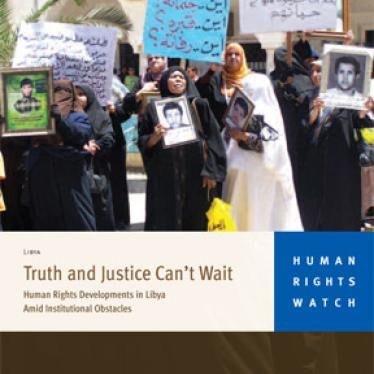(New York) - The Libyan security forces killed at least 24 protesters and wounded many others in a crackdown on peaceful demonstrations across the country, Human Rights Watch said today. The authorities should cease the use of lethal force unless absolutely necessary to protect lives and open an independent investigation into the lethal shootings, Human Rights Watch said.
Hundreds of peaceful protesters took to the streets on February 17, 2011, in Baida, Benghazy, Zenten, Derna, and Ajdabiya. According to multiple witnesses, Libyan security forces shot and killed the demonstrators in efforts to disperse the protests.
"The security forces' vicious attacks on peaceful demonstrators lay bare the reality of Muammar Gaddafi's brutality when faced with any internal dissent," said Sarah Leah Whitson, Middle East and North Africa director at Human Rights Watch. "Libyans should not have to risk their lives to make a stand for their rights as human beings."
Some of the worst violence was in the eastern city of Baida. At around 1 p.m. on February 17, according to sources in Libya, hospital staff put out a call for additional medical supplies, as they became overwhelmed with the medical needs of 70 injured protesters, half of them in critical condition due to gunshot wounds. On the night of February 16, security forces had attacked peaceful protesters with teargas and live ammunition, shooting dead two protesters, according to protesters who spoke to Human Rights Watch. Geneva-based Libya Human Rights Solidarity has confirmed three of the names of those shot dead so far: Safwan Attiya, Nasser Al Juweigi, and Ahmad El Qabili.
One protester told Human Rights Watch that a new protest started on February 17, after noon prayers and the funerals of those killed on February 16. Joined by hundreds of other protesters, families marched toward the Internal Security office, chanting, "Down with the regime" and "Get out Muammar Gaddafi." Some protesters filmed the protests with mobile phones and posted them online.
One injured protester in a hospital in Baida told Human Rights Watch that he was sitting near the intensive care unit there and had confirmed that security forces had shot dead 16 people and wounded dozens of others. He said that Special Forces and armed men in street clothes fired live ammunition to deter protesters.
A protester in Benghazi told Human Rights Watch that hundreds of lawyers, activists, and other protesters gathered on the steps of the Benghazi Court calling for a constitution and respect for the rule of law. Early in the day, sources in Libya told Human Rights Watch that security forces had arrested a Benghazi journalist, Hind El Houny, and Salem Souidan, a family member of a group that has been seeking justice for the massacre of inmates in Abu Salim prison in 1996. Security forces also arrested a former political prisoner, Abdel Nasser al-Rabbasi, in Bani Walid.
The protester said he saw groups of men in street clothes armed with knives, later joined by Internal Security forces, charging the protesters to disperse them. The protester told Human Rights Watch that he believed security forces had shot dead at least 17 protesters during the day, mostly near Abdel Nasser Street. Human Rights Watch was able to confirm eight of those deaths.
It appears that the government also has coordinated pro-government supporters to confront the demonstrations. On February 16, subscribers to Libyana, one of two Libyan mobile phone networks, received a text message calling upon "nationalist youth" to go out and "defend national symbols." At around 11:30 p.m. on February 17, a protester in Tripoli told Human Rights Watch that anti-government protests had started in Tripoli also.
"It is remarkable that Gaddafi is still copying the very same tactics that failed Hosni Mubarak so completely just across the border," Whitson said. "Using security forces and armed thugs to deny people the right to express their opposition to the government increasingly looks destined to fail."







